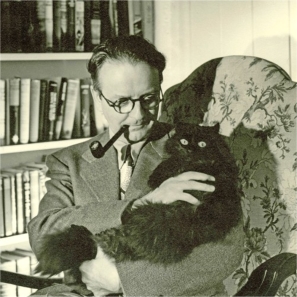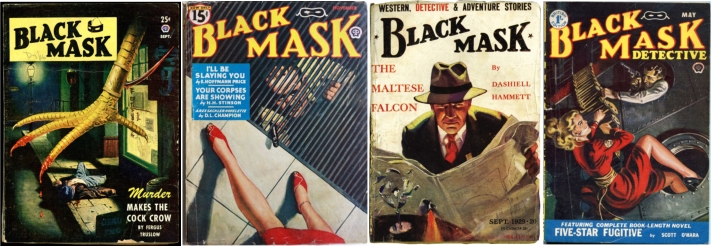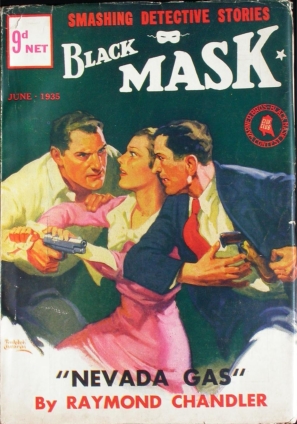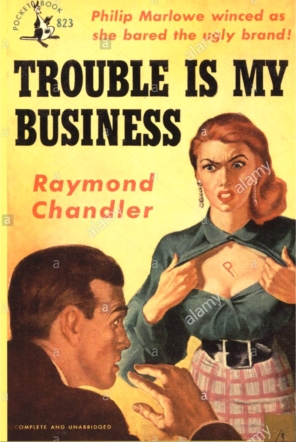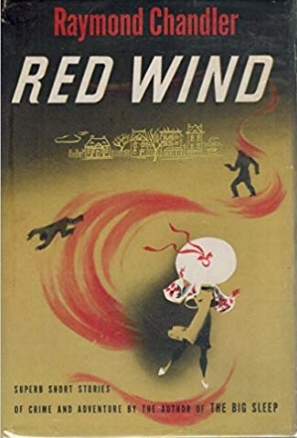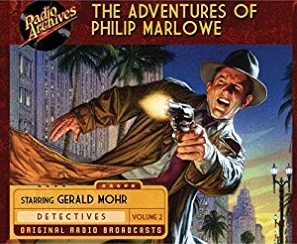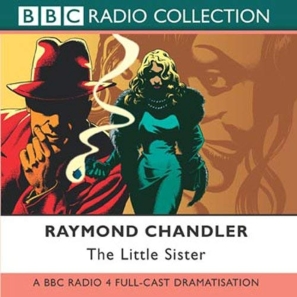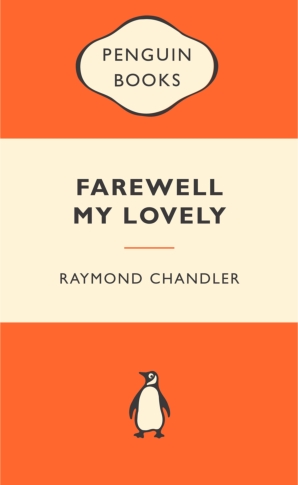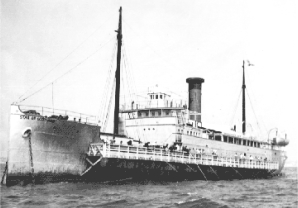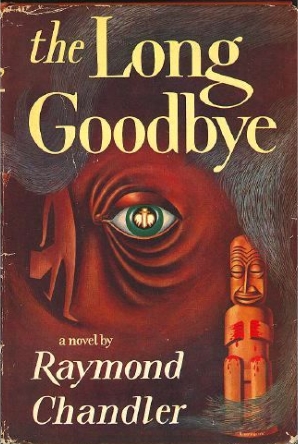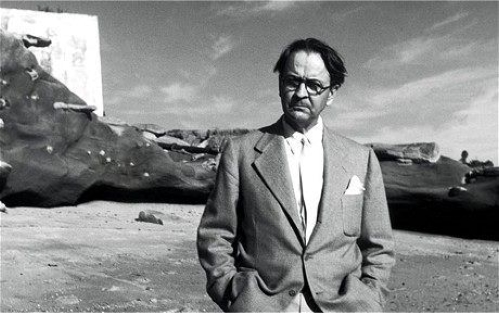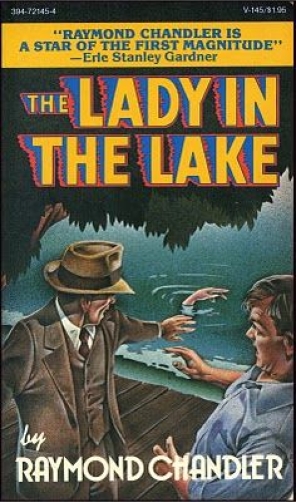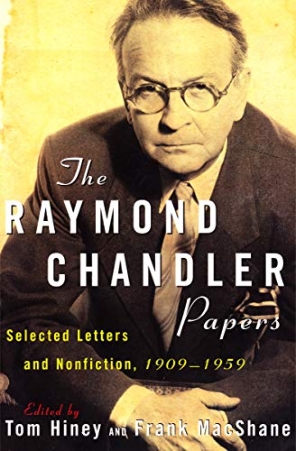Chandler's stories are
all episodic -- could be seven scenes (or Chapters) like The Red Wind (1938) or
twelve like Nevada Gas (1935), an evil tale about an evil gangster who has a
big saloon where the back seat can sealed off as a gas chamber. No one forgives
anybody in this one except the P.I. DeRuse, a gambler with a Mauser in an ankle
holder. His chick cheats on him with a double-crossing nightclub hood called
Dial but hey, all's fair in love and war, and Dial gets gunned anyway. The
central motif of the gas limo works as an ironic play on the State of Nevada's
means of capital punishment, i.e. death by cyanide gas. Hoods gassing hoods
seems fitting. Chandler was against capital punishment in general -- especially
for women -- although, as his stories show, some people deserve to die because
of their crimes.
The King in Yellow
(1938) is nine scenes about a hotel security man and his run-in with a jazz
musician who dresses in yellow and parties with his groupies until he implodes.
The title is a lift from the Robert W. Chambers (1895) 'The King in Yellow', a
play that drives all who read it mad. When Steve Grayce, the house dick finds
King Leopardi lying dead in faux yellow silk pyjamas, he says, "The King in
Yellow. I read a book with that title once...." It's unlikely that Leopardi
read it, though, so there's no real internal metaphor at work here, just a
motif, not an opera. Leopardi -- the familiar Faustian artist, beautiful music,
ugly personality. Murdered, of course. Live like a king, die like a bug.
There's a "plot" behind it all, although it's messy, like most of these Black
Mask stories. Chandler admitted he was "fundamentally uninterested in plot",
blamed himself for not planing far enough ahead when writing. To some extent it
was a problem of having too many murders in too short a distance, which then
leaves the finale expected, regardless of how unexpected the unmasking might
be.
These 'mini-novels' --
collected under various titles such as The Simple Art of Murder or Trouble Is
My Business -- suffer from a density of violence that's less of a problem in
the long narratives, the Marlowe novels, starting with The Big Sleep (1939) and
ending with The Long Goodbye (1953) (or, if you prefer, the unfinished novel
Poodle Springs that Chandler was working on up until his death in 1959). In
fact, as has been noted by others, certain scenes and characters from the Black
Mask stories were used again in the novels, most obviously Killer In The Rain,
which provided a large and important part of the plot in The Big Sleep. The
names were changed, details here and there, but essentially Killer In The Rain
becomes the Carmen Sternwood smut photo blackmail gambit -- same rich girl,
same bookshop sleaze, same love-struck chauffeur, same blackmailers in the
wings.
'the love story and
the detective story cannot exist, not only in the same book -- one might almost
say in the same culture' (Chandler)
Is the Big Sleep
really Chandler's first masterpiece... or even a masterpiece at all? The
subject has been distorted by the Bogart-Bacall myth, and the rendering of the
movie version as a bad boy-bad girl romance. The ending of the novel is
jettisoned, the females airbrushed, and goodness prevails. This is not to say
that Bogart doesn't do a good job as Marlowe -- as Chandler himself said, all
Bogart had to do was enter a room to dominate a scene -- and that Bacall isn't
good in her role as an accomplished flirt and late night gambler. They are
good, but the script they follow is less about the grim story of moral
corruption presented in the novel than a Hollywood fantasy finessed for a
soft-hearted public. The look and the feel of the film is great, as you would
expect from an accomplished director like Howard Hawks, so it might be a bit of
a surprise to learn that it was scripted by the illustrious William Faulkner
and a young Leigh Brackett ('Queen of the Space Opera'). Of course the
narrative had to be abridged to fit the rhythm of a two hour movie and the era
was more comfortable with a male villain (Eddie Mars) than a killer slut
(Carmen Sternwood). Interestingly, Chandler thought Martha Vickers as Carmen
stole the female lead from Bacall as Vivian, but as the majority of her scenes
were cut in the final edit, her outstanding performance went by the
board.
'I came out at the
fourth floor sniffing for air. The hallway had the same dirty spittoon and
frayed mat, the same mustard walls, the same memories of low tide'
The novel made no
impact at all when first published, and it was only later when it was issued as
a paperback that it gained traction. The critics ignored it -- Chandler was
from the crime fiction ghetto. The opening, where Marlowe goes to the Sternwood
estate to receive his instructions is very good (and is one sequence the film '
faithfully followed) and the ending in the derelict oil field is likewise good.
This ending has a Gothic feel to it, re-jigged for the modern era of industrial
wealth and its consequence. The character of Carmen -- about as likeable as
Lucretia Borgia -- contains a secret within a secret, is actually driving the
action even when she isn't around. Marlowe, hired to solve one problem,
actually exposes a worse one more or less inadvertently because of his
fascination with big sister Vivian. Carmen's erotic photos and Vivian's
gambling are racy occupations in racy times, but aren't the real issue. It's a
clever plot, acted out in the noir shades of wind, fog and rain. Thunder too.
Perhaps the middle stanza is padded out a bit too much with story recaps --
i.e. when Marlowe visits the Bureau of Missing Persons -- which slow the
action, might cause a few readers to skip on (or drop out altogether). But the
narrative circularity is impressive.
'Knights had no
meaning in this game. It wasn't a game for knights.'
While you couldn't
call it supernatural, the resolving action has a strange feel to it, as if
Marlowe has been searching for his own killer, not the missing husband of the
woman he almost loves. It's not a happy ending, not a Hollywood ending, but it
is Hollywood and it is an ending.
'In Hollywood, they
destroy the link between the writer and his subconscious' (Chandler...
after he'd had enough)
Chandler made the big
time in 1944 when Paramount Pictures phoned and asked him to write the script
for Billy Wilder's production of the James M. Cain novel Double Indemnity.
Chandler worked with Wilder on vamping Cain's photo-dialogue, making it more
aural (rather than visual) to suit the L.A. vernacular. In a letter to Cain,
Chandler explained why he did what he did; it's a polite letter, although it
probably rankled Cain to be versed in the methods of the Hollywood screen
writer. It was a successful production led by three A-list actors: Fred
McMurray, Barbara Stanwyck, and Edward G. Robinson. Today Double Indemnity is
seen as the Holy Grail of the Hollywood film noir. In hind-sight, you can see a
lot of Philip Marlowe in the love chump insurance salesman Walter Neff, and his
sexual manipulation into committing a murder on behalf of the femme fatale
Phyllis Dietrichson. With a different ending, you could see Neff as Marlowe
before Marlowe becomes a shamus.
Due to the success of
Double Indemnity, Chandler soon got other gigs as a screenwriter, and why not?
He was a natural "scenic" writer, with or without dialogue. And his dialogue
was superb move-the-action-without-exposition stuff. He knew underworld jargon,
he knew business speak, he knew cop talk, he knew all manner of men and unlike
many male writers, he knew women well enough that women believed his female
characters. And he knew violence, could choreograph it like a drill sergeant.
But like most fiction
writers, he had trouble with the studio system, and the contractual requirement
that he be on the lot, in the office to be on hand for the director or the
producer or whoever needed him. Writers are by necessity loners. They don't
work well on the assembly line. Chandler had disagreements with Wilder,
insisted on working from home. He had the same problems with Alfred Hitchcock,
whom he didn't respect at all, called him "a fat bastard". The film they were
working on was Strangers On A Train (1949), from the novel by Patricia
Highsmith. Although the film remains popular today and is frequently cited as
one of Hitchcock's best, Chandler thought the plot was highly improbable, based
on a swap murder motif that would never happen in reality. Yet so much of the
basic mystery novel is based on game-play the public seemed to go along with it
all, despite this and a very flat ending. Chandler disliked Hitchcock's
penchant for placing visual effect before script, using unlikely angles (POV)
or weird shots through fishbowls and the like.
Chandler said:
"(Strangers) had no guts, no plausibility, no characters, no dialogue. But of
course it's Hitchcock....'
He had more control
over the situation with his script for The Blue Dahlia (1946), which was all
his, with a full ensemble of glittering night-life sleaze: a returning war
hero, a faithless wife, a nightclub hood, a blackmailing peeper, couple of
straightcops, a seedy skidrow hotel clerk, a brain-damaged vet, a fantasy
blonde and a whole lot of bodies on stage when all's said and done. The vet
(Alan Ladd) returns to L.A. with two buddies from the Pacific theatre to find
his wife Helen (Doris Dowling) in full party mode with her lover, a slick
operator who owns a nightclub called The Blue Dahlia. Eddie Harwood. Skinny,
with a skinny face and eye-brows for a moustache (the familiar dance hall
lizard). Things don't go well, naturally, and Johnny (Ladd) soon finds himself
on the lam for the murder of his slinky, hostile wife. However a mysterious
blonde in a coupe shows up and rescues Johnny from the rain, drives him to
Malibu in the first of a series of crude coincidences that has Ladd remark,
"Your timing's good...." Eventually nearly everyone is a suspect... some live,
some die... and a couple die very conveniently. Guess who: she's a tramp, he's
a hood. By the end it's she's a widow, he's a widower, and they might as well
get together, no tears lost. Chandler Lite.
The real Chandler has
a current of sadism running in his protagonists that few leading men caught.
Bogart did, Dick Powell was close, and Fred McMurray had a nice ambiguity about
him that fit his part. Chandler liked all three. He liked Alan Ladd, although
Ladd was just too nice, Boy Scout nice. Sure, his character knew a bit of HTH
(hand-to-hand) but he was too small, lacked that grit that the Chandler man has
when going up against the hoods. Gerald Mohr certainly had it (at least for
radio drama), a tough-love bully with a sense of humour and a sucker in the
clinch. Later versions of the Marlowe character are worth considering too. The
1983 HBO series starring Powers Booth is quite good. Mitchum tried but maybe he
was too old, too late, too Mitchum.
Chandler wrote a
Marlowe script that never made the screen but was later converted into the
novel Playback, published in 1958, just before his death. It's definitely out
of step with the earlier Marlowe stories -- romantic, more middle-class, sends
Marlowe to San Diego ('Dago') and the oceanside resort of Esmeralda in pursuit
of a fugitive babe, more or less in parallel with Chandler's own move to the
affluent suburb of La Jolla. It's another tale of blackmail, muggings and
sexual harassment. No doubt the SoCal location would've looked good in
Technicolor, but as a novel, you wouldn't want to rate it or date it as his
last.
Again, Chandler
Lite. |
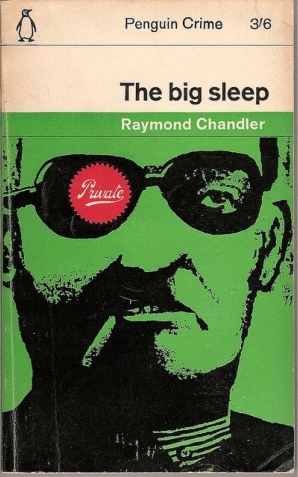
The poetry of
illiteracy: Chandler started out as a poet in his younger days, published a few
poems in the London literary mags and papers of the day. His grasp of the
street idiom, its music, its rhythm, its metaphor, its attitude... the
sub-cultural politics, the anarchy and the telepathy. All this is brilliant.
Death comes in iambic pentameter, as it does for all poets. The hand gun was
the cell phone of the day, the fastest way of doing business. And the talk? The
talk was all poetry, street jive replete with subtext and code. Languages? Yes,
Chandler was good at languages. English, French, German... some Latin, some
Greek... and fluent street.
'The bell chimed
and a tall dark girl in jodpurs opened the door. Sexy was very faint praise for
her. The jodhpurs, like her hair, were coal black. She wore a white silk shirt
with a scarlet scarf loose around her throat. It was not as vivid as her mouth.
She held a long brown cigarette in a pair of tiny golden tweezers. The fingers
holding it were more than adequately jeweled. Her black hair was parted in the
middle and a line of scalp as white as snow went over the top of her head and
dropped out of sight behind. Two thick braids of her shining hair lay one on
each side of her slim brown neck. Each was tied with a small scarlet bow. But
it was a long time since she was a little girl.' (Miss Dolores Gonzales, Little
Sister)
His characters are
all first impressions, not recollections. Police aside, if he knows someone, he
knows him or her through the newspaper or the silver screen. Some are mere
rumours, although often show up under an alias. Even though Chandler used the
investigation narrative, for the most part what you see is what you get. L.A.
is a transient world. Everybody in Marlowe's reality seem to be from somewhere
else or nowhere at all. Some hoods might have a mythology but none ever have a
mother, and if they have a woman, well, she's strictly visual. And available.
And murder comes easily to just about any and all as if they're all combat
veterans and carry on as if the war has never ended, just spread to America,
became socialized.
"We're a big, rough,
rich, wild people," said Marlowe, "and crime is the price we pay for it." (The
Long Goodbye)
Johnny (Alan Ladd)
confronts his wife Helen (Doris Dowling) in The Blue Dahlia
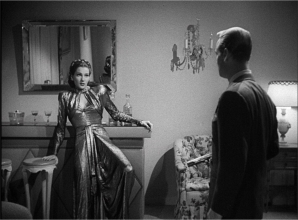
'the best scenes I
ever wrote were practically monosyllabic' (Chandler) |
